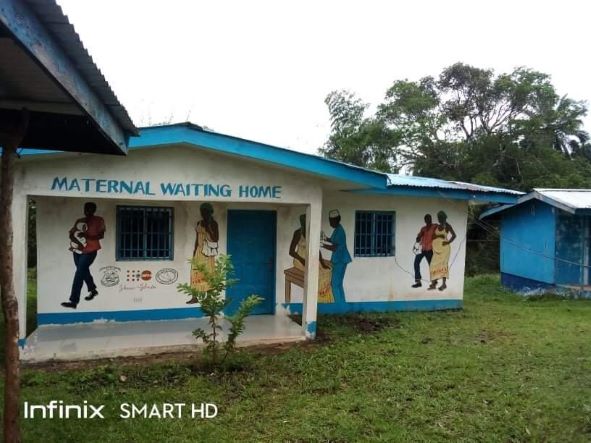PHOTO: Maternal Waiting Home
By R. Joyclyn Wea
More childbearing women and girls preferred home delivery over going to health facilities for save delivery, stakeholders in the health sector have said. And this is largely due to fear of contracting the Covid-19 virus, they added.
The situation is even worst in rural Liberia where access to health facility for women has always been a huge challenge. Pregnant women have to travel miles away from home to get to the nearest facility—a situation that led to complications or most times death, of either the mother or the baby, along the way.
District Health Officer (DHO) of Todee Statutory District, Stephen Lamah, attributes the situation to the infordemic level that has inundated the public space since the outbreak.
The outbreak and the subsequent surge in coronavirus cases were also accompanied by a spark in infodemic, which speaks of misinformation and disinformation that have characterized the global fight against COVID-19.
The Todee DHO says the lack of resources coupled with amounting misinformation regarding COVID-19 has made many women develop the mindset that they would contract the virus or tested positive when they visit the health facility.
“what we have been doing so far as health workers is to first address the Covid-19 myths that is keeping pregnant women away from the facilities,” he says, “We are educating them on the virus and the importance of coming to the health facility every time whether they are pregnant or not.”
Though the number of pregnant women visiting the health facility has reduced, Lamah adds that there are others who are still seeking the services of the Nyehn Health Center in Todee and other nearby areas for their monthly checkup.

This situation is leading to some pregnant women, especially those in the rural parts of the country to hire the services of traditional midwives for their normal routine.
Others are relying upon homecare inspite the enormous risks pose to their individual lives as well as those associated with avoiding health facilities where the professionals are to render the needed services.
Mary Pewee, a mother of four and Resident of Bensonville, says “for me, I stopped going to a hospital when the virus first started because they say when you go to the hospital the doctors will tell you to say you get the virus. She continues “so I was buying my little drug until God help me I delivery.”
Madam Pewee says she did home delivery due to the lack of resources and fear of being diagnosed with the virus upon a visit to the health facility. She has a six-month-old baby.
Research have it that a pregnant woman is to visit the health facility twice a month under normal circumstances, but this is not happening due to the pandemic and its accompanying fear, district health officer of Todee Statutory District.
As the result of the growing wave of maternal deaths and other maternal related issues, the office of the Family Health Division (FHD) at the Ministry of Health (MOH) on June 30, 2020, issued a released cautioning every pregnant woman to make use of the health facilities to access routine services and do away with self-treatment of home care.
The FHD frowned at those performing home delivery, especially health workers. “We cannot be doing this at this time when the government and partners are doing all they can exert efforts in reducing maternal and neonatal mortality in the country,” the release said.
“Health practitioners should be the ones encouraging pregnant women to make use of health facilities during this period of the pandemic.”
“COVID can be contradicted at home, other areas and not specifically at the health facilities, as such; people should stop home delivery and start making use of the health centers for quality maternal and newborn health services,” the release added.
The FHD could not provide statistics on the number of pregnant women who have given birth since the outbreak of the virus and those who have delivered outside of health facilities. But it says the situation is not only unique Montserrado, but across the country.
The head of Sonniwein Health Center in Central Monrovia notes that a lot of pregnant women and girls that are still utilizing the facilities. Irene Sherman Esin says that there are few others who have abandoned the center, but normal delivery is taking place at the facilities.
“For me I can go to Monrovia for treatment because most times when you go to the health facility here, there are no drugs and nurses will prescribe drugs for you to buy,” a pregnant woman of Nyehn in rural Montserrado County tells this fellow on August 31, 2021, in the district.
Unlike others who are staying away due to fear, Beatrice Sumo dare not to stay away from the hospital, though she feels disappointed by the lack of drugs at the health facility most time.
“All the nurses at the hospital know my problem, God bliss me I survived from home delivery to I can’t do it again, and since that time I been having a problem so all my children I have to be going to big hospitals until I can give birth,” Beatrice narrates.
This story was produced with support from Journalists for Human Rights (JHR), through its mobilizing media in the fight against COVID-19 in partnership with FrontPage Africa.

